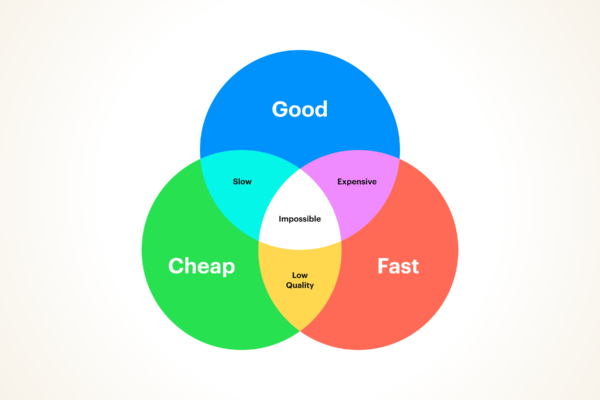Professional freelancers don’t do “gigs”
Are you expendable, temporary help, or a valuable long-term business partner?
Listen to an audio version of this story
I’ve been a freelance designer for 17 years, so I guess I’ve been part of the “gig economy” even before it was the cool Millennial hipster thing to do. But I can’t stand the word “gig”. If being an independent consultant requires me to describe my projects as gigs, then count me out.
Gigs are what struggling bands do in dank old bars. Gigs are what Uber drivers chase on the weekend to supplement their income. Gigs are what Fiverr and Upwork freelancers undercut each other for. Gigs are what your perennially under-achieving high school friend does to stay afloat between jobs.
I’m a professional freelance designer. I don’t do gigs.
I define gig work as temporary or incidental. Short-term, which usually means shallow and low-value. One-off projects you do to earn some cash so you can go looking for something more meaningful.
Nobody aspires to do gigs. They feel like the reluctant next step of someone who hasn’t quite figured out what they want to do with their lives. “I’ll just do this for now until I figure out something better, because it’s easy.”
That’s not a career plan.
Being a freelancer means building your own business. Jumping aimlessly fromgig to gig may earn you some money, but it doesn’t aid your business development. Before you take that next gig, think “is this gig going to help me get closer to any of my business goals?” Or, “what value might this project bring me beyond the financial reimbursement?”

Freelancing ≠ Upwork
Ignore the dangerous advice that you can hit it rich on cheap marketplaces. Your ideal clients don’t live there.
What’s the opposite of a gig?
Big, deep, meaty, meaningful projects that lead to long-term business partnerships and bountiful trust. That’s the type of work professional freelance business owners thrive with.
You may argue with me about what a gig really means — and that’s expected because these days that it can mean almost anything that’s not full-time employment. But what I want you to take away from this article is this:
Do your clients see you as expendable, temporary help, or a valuable long-term business partner?
Just yesterday a potential client said to me “we’d consider you a part of our team as if you were sitting there at the desk next to us” — and I knew right away that these guys get it. They’ll be easy to work with, even though I’ll be working 100% remotely from the other side of the city (for that matter, it could be the other side of the world).
Freelancers are in a unique position to become deeply embedded into their client’s company and processes, even if they’re working remotely. Far more so than an agency could. It’s that unmatched level of one-to-one intimate service and commitment that attracts clients to choose an independent creative over a larger full-service agency.
With that personal commitment comes the opportunity for fruitful long-term relationships. I’ve have clients who I’ve worked with for over 10 years. They keep coming back to me — often through multiple lifecycles of their website — because they see me as their long-term design partner. Not as a one-off project.
That’s partly because I have a long record of demonstrating my value to them, but also because that’s the type of relationship I sell. That’s how I describe my services an that’s what I pitch to clients.
Developing long-term client relationships and deep, meaningful projects is how I build my business.
How to talk to potential clients
Nail that first interview, and they’ll be begging to work with you.
Stop chasing gigs. Start building partnerships.
Freelancing as a career, rather than a temporary measure, shouldn’t be about chasing the next gig. It’s not a game of quantity, but quality.
Gigs come from cost clients, while partnerships come from value clients. Cost clients care about getting the lowest price. Value clients care about getting the best result. Read more about cost vs. value clients.

Are you working for cost-clients or value-clients?
Knowing the difference will mean everything to your freelance business.
One long-term value-client-partner, can be worth more than years of one-off gigs.
Partners go out of their way to work with each other, and support each other’s causes. Partners trust and promote each other. Partners know working with the right people is paramount to niggling over hours and dollars.
You want your clients to consider you a partner. This is how you build a reputable freelance business.
Gigs do not make partners. If a gig doesn’t open a door to something more, leave it for someone else. You’re a professional freelancer, a solopreneur, not a gig-worker.
Want to comment?
See this story on Medium
Hi, I'm Benek Lisefski. Since 2001 I've run my own independent design business. Join me as I unfold 20 years of freelance business knowledge: honest advice and practical tips to help you take your indie career from good to great.
MediumTop writer in Design, Business, Creativity, and Entrepreneurship.
 Menu
About
Menu
About


